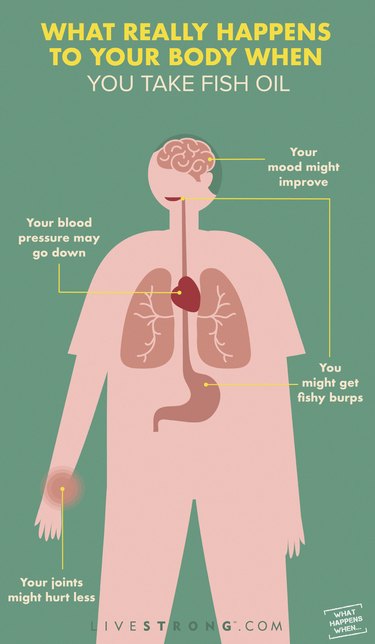
Healthy fats are our friends. In fact, fat is an essential part of a nutrient-dense diet — but not all fats are one and the same.
The omega-3 fatty acids naturally found in fish, for example, are significantly better for us than the partially hydrogenated oils found in ultra-processed and packaged foods.
Video of the Day
Video of the Day
But if omega-3s are so stellar, should everyone be taking fish oil supplements for optimal health? Here's what the research says about what fish oil does, who might benefit from fish oil supplements and more.
What Is Fish Oil?
Fish oil comes from the fatty tissue of fish like salmon, sardines, mackerel, herring and lake trout. The primary fats found in fish are omega-3 fatty acids, a type of polyunsaturated fat.
The two main types of omega-3s found in fish are eicosapentaenoic acid (EPA) and docosahexaenoic acid (DHA).
Most fish oil supplements consist of marine-derived EPA and DHA. "The difference between products will be the EPA to DHA ratio, which can range from 0.3 to 3," explains Tyler Preston, RD, registered dietitian, performance coach and founder of the practice Preston Performance.
"If you want to simply resolve a deficiency, a more balanced EPA to DHA ratio of 1:1 would be appropriate," Preston says.
There are different types of omega-3 supplements, including fish oil, cod liver oil and krill oil. Cod liver oil provides vitamins A and D in addition to EPA and DHA, per the National Institutes of Health (NIH).
Both EPA and DHA are essential for our health. "While DHA might have a stronger anti-inflammatory effect, EPA targets the balance between pro-inflammatory and anti-inflammatory proteins, illustrating their symbiotic relationship," Preston says.
Tip
Alpha-linolenic acid (or ALA) is an omega-3 fat found in plants, like walnuts, chia and flax seeds and canola oil. ALA can convert into EPA and DHA in the body, but not well. Some estimates say anywhere from 0 to 4 percent of ALA is converted to DHA, according to Oregon State University. Bottom line: We get much less bang for our buck with plant-based omega-3s compared to those found in fish.
The Effects of Fish Oil
Your Triglyceride Levels May Go Down
Omega-3 supplements have been shown to lower elevated triglyceride (TG) levels in the blood, per Michigan Medicine. That's pretty important as high TGs are linked to an increased risk of heart disease.
Prescription medications that supply high doses of omega-3 fatty acids (around 4 grams per day) have been found to reduce TG levels by about 30 percent in people with hypertriglyceridemia, according to August 2019 research in the journal Circulation.
But for the average person with healthy lipid levels and no fatty acid deficiencies, fish oil supplements aren't essential as long as they're eating fish regularly. Aim for at least two 3.5-ounce servings of fatty fish per week, as is recommended by the American Heart Association.
FYI, people who ate fish twice weekly saw significantly greater reductions in their LDL cholesterol compared to those who took fish oil supplements, per a December 2017 study in Nutrition & Diabetes.
Should I Take Fish Oil?
People at risk of heart disease aren’t the only ones who might benefit from fish oil supplements. “Athletes may require a higher intake of omega-3s to account for greater systemic inflammation from exercise and training,” Preston explains.
Vegetarians with low intakes of ALA may consider omega-3 supplementation given the inefficient conversion of ALA to EPA and DHA in the body. Pregnant people can also benefit from omega-3 supplements.
Your Mood Could Improve
Fish is called "brain food" for a reason.
The anti-inflammatory fats in fish help maintain the structure and function of cell membranes across the body, including those found in the brain. That may be why some studies have shown that people who eat more seafood have a decreased risk of cognitive decline, per the National Center for Complementary and Integrative Health.
As of now, there's little evidence we should pop fish oil pills for the prevention of conditions like dementia, but the supplements may bring benefits for other neural conditions. Take depression, for example: Research suggests that fish oil supplementation, particularly EPA, is linked to reduced symptoms of depression, per an August 2019 meta-analysis in Translational Psychiatry.
One theory of the pathophysiology of depression involves imbalances in neurotransmitters in the brain. "By altering serotonin and dopamine receptor number and function, omega-3s can theoretically help correct these dysfunctional pathways in depressed people, improving their depressive status," Preston tells LIVESTRONG.com.
Because findings on the efficacy of omega-3s for depression are mixed, experts agree that more research is needed before the capsules become a mainstay of mental health treatment. That means: If you're on anti-depressants, don't quit your meds just yet — and always talk to your doctor before starting a new supplement or if you're considering going off prescribed meds.
If you're open to eating seafood, start with the real deal instead of a fish oil supplement. For now, get your good mood food in with at least two servings of fish weekly.
Your Blood Pressure May Go Down
Omega-3 supplementation may help reduce blood pressure levels in people with hypertension.
"According to NIH research, omega-3 fatty acids work by directly activating large-conductance calcium-dependent potassium channels in the blood vessels, which lowers blood pressure," says Angela Marshall, MD, a board-certified internist and the CEO of Comprehensive Women's Health.
Fish oil supplements with a moderate amount of DHA and EPA (think: the same amount you'd get from eating two to three portions of seafood per week) were found to lower blood pressure by 5 mmHg in people with systolic hypertension, per a March 2016 study in The Journal of Nutrition. Though it might not sound like a lot, that 5-point decrease could potentially lead to a 20 percent reduction in heart disease risk, according to the researchers.
For now, the majority of the research supports a well-balanced, low-sodium diet packed with fruits, vegetables, heart-healthy fats (like fish!), lean proteins and whole grains over fish oil supplements for lowering blood pressure levels.
Your Joints Might Hurt Less
"Studies show that omega-3 fatty acids are helpful at lowering joint inflammation, which is helpful for people with inflammatory disorders like rheumatoid arthritis," Dr. Marshall says.
These healthy fats have been shown to inhibit the production of inflammatory compounds like cytokines and interleukins in the body. It's not all that surprising, then, that fish oil supplements have been associated with improvements in symptoms among people with inflammatory conditions like rheumatoid arthritis (RA), per Oregon State University.
While the reduction in pain is often modest, it may be enough to decrease one's need for pain medications like NSAIDs, according to the Mayo Clinic.
You Might Get Fishy Burps and Nausea
If you're just starting to add fish oil supplements to your regimen, beware of the potential for a fishy fragrance and aftertaste, as well as some not-so-comfy GI symptoms.
"Common side effects, though normally mild, can include heartburn, nausea and GI discomfort, which are all common issues with ingesting too much fat in one sitting," Preston says.
You could avoid the fishy aftertaste by storing your bottle in the freezer or taking the pill with meals, per the Arthritis Foundation.
And note that the higher the dose, the greater your risk for adverse reactions. The Food and Drug Administration (FDA) recommends no more than 5 grams of EPA and DHA combined per day from supplements, per the NIH. But, if your doctor prescribed fish oil for a heart condition, the dosage may be higher.
Tip
Timing matters when it comes to taking omega-3 supplements. “Fish oil supplements can be taken at any time during the day, however, they can sometimes cause nausea when consumed on an empty stomach,” Preston notes.
“Since fish oil is a fat-soluble supplement, we can enhance absorption by taking them with a meal.”
The Bottom Line
If you eat seafood, opt for fatty fish often before reaching for a fish oil supplement.
"I always tell people to go for the whole food instead of a supplement if they can," says William W. Li, MD, physician and author of Eat to Beat Disease. "Regular consumption of oily fish, such as salmon, sardines and anchovies is a great way to get omega-3s. Not only do you get the healthy fat, but seafood is a good source of protein as well."
While fresh, wild-caught fish is optimal, flash frozen and even tinned seafood can be just as nourishing, and, not to mention, more budget-friendly.
And if you don't eat fish and you're interested in going the supplement route, remember: "It's a good practice for anyone taking any supplements to tell their doctor to discuss the possibility of drug-supplement interactions," Dr. Li says.
Related Reading

- Mayo Clinic: “Fish Oil”
- National Institutes of Health Office of Dietary Supplements: “Omega-3 Fatty Acids Fact Sheet for Professionals”
- Michigan Medicine: “Cholesterol and Triglycerides: Eating Fish and Fish Oil”
- Circulation: “Omega-3 Fatty Acids for the Management of Hypertriglyceridemia: A Science Advisory From the American Heart Association”
- National Center for Integrative and Complementary Health: “Omega 3 Supplements: In Depth”
- Translational Psychiatry: “Efficacy of Omega-3 PUFAs in Depression: A Meta-Analysis”
- Oregon State University: “Essential Fatty Acids”
- The Journal of Nutrition: “Consumption of Fish Oil Providing Amounts of Eicosapentaenoic Acid and Docosahexaenoic Acid That Can Be Obtained from the Diet Reduces Blood Pressure in Adults with Systolic Hypertension: A Retrospective Analysis”
- American Heart Association: “Fish and Omega-3 Fatty Acids”
- Nutrition & Diabetes: “Comparison of the Effect of Omega-3 Supplements and Fresh Fish on Lipid Profile: A Randomized, Open-Labeled Trial”
